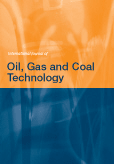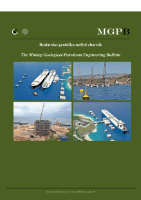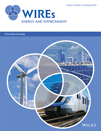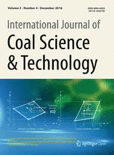
International Journal of Oil Gas and Coal Technology
Scope & Guideline
Unleashing Insights in Oil, Gas, and Coal Technologies
Introduction
Aims and Scopes
- Energy Resource Management:
Research focused on the optimization and management of oil, gas, and coal resources, including extraction techniques, production efficiency, and economic viability. - Environmental Impact and Sustainability:
Studies assessing the environmental implications of fossil fuel extraction and use, exploring CO2 sequestration, emissions reduction technologies, and sustainable practices in the energy sector. - Material Science and Engineering Innovations:
Investigation into new materials and engineering solutions for improving drilling, extraction, and processing technologies, including advanced drilling fluids and enhanced oil recovery methods. - Geological and Reservoir Characterization:
Research dedicated to understanding geological formations, reservoir behavior, and the characterization of tight and unconventional reservoirs to enhance resource recovery. - Data Science and Machine Learning Applications:
Utilization of machine learning and data analytics to improve predictive models for reservoir performance, production forecasting, and operational efficiencies. - Chemical Engineering in Energy Production:
Exploration of chemical processes involved in energy production, including biodiesel production, gasification, and refining processes.
Trending and Emerging
- Carbon Capture and Sequestration Technologies:
There is a notable increase in research on carbon capture, utilization, and storage (CCUS) technologies, driven by the urgent need to mitigate climate change impacts and reduce greenhouse gas emissions. - Hydrogen Production and Utilization:
Emerging interest in hydrogen as a clean energy carrier, with studies focusing on production methods, including green hydrogen, and its integration into existing energy systems. - Advanced Materials for Energy Applications:
Growing research on the development of novel materials for enhanced oil recovery, improved drilling technologies, and sustainable energy applications, indicating a trend towards material innovation. - Digitalization and Smart Technologies in Energy:
An increase in studies utilizing artificial intelligence, machine learning, and data analytics to enhance operational efficiencies, predictive maintenance, and resource management in the oil and gas industry. - Environmental and Health Risk Assessments:
A rising focus on evaluating the environmental and health impacts associated with fossil fuel extraction and utilization, reflecting a broader societal concern for sustainability and safety.
Declining or Waning
- Conventional Oil and Gas Exploration:
Research focused on traditional exploration techniques for oil and gas appears to be less frequent, as there is a shift towards unconventional resources and advanced extraction technologies. - Coal Utilization Technologies:
The focus on traditional coal utilization methods is declining as the industry shifts towards cleaner energy alternatives and carbon capture technologies. - Hydraulic Fracturing Studies:
Although hydraulic fracturing remains important, the volume of new research specifically on this technique has decreased, possibly due to saturation in the literature and a shift towards more holistic reservoir management approaches. - Economic Impact Studies of Oil Price Fluctuations:
Research specifically analyzing the economic impacts of oil price changes has waned, with fewer studies being published as the focus shifts towards technological and environmental innovations.
Similar Journals

Rudarsko-Geolosko-Naftni Zbornik
Connecting Knowledge and Innovation in GeosciencesRudarsko-Geolosko-Naftni Zbornik, the esteemed journal published by the University of Zagreb's Faculty of Mining, Geology and Petroleum Engineering, serves as a vital platform for advancing knowledge in the fields of Earth sciences, energy, and geology. With an ISSN of 0353-4529 and an E-ISSN of 1849-0409, this open-access journal has been disseminating high-quality research since 1989, contributing significantly to scientific discourse in Croatia and beyond. As of 2023, it holds an impressive categorization in various quartiles, notably achieving Q2 in Earth and Planetary Sciences and Q3 in several related domains, showcasing its relevance and impact within the academic community. The journal's commitment to quality is reflected in its Scopus rankings, placing it in competitive positions across diverse disciplines. Researchers, professionals, and students alike will find invaluable resources and insights that foster innovation and collaboration in their respective fields, making Rudarsko-Geolosko-Naftni Zbornik an essential read for those dedicated to exploring the complexities of natural resources and environmental challenges.

Upstream Oil and Gas Technology
Advancing Innovation in Upstream Oil and GasUpstream Oil and Gas Technology, published by Elsevier, is a leading journal dedicated to advancing knowledge and innovation in the upstream oil and gas sector. With an ISSN of 2666-2604, this journal offers insightful research articles and critical reviews from 2019 to 2023, creating a valuable repository of knowledge for professionals and academics alike. Strategically positioned in the Q2 quartile of various related fields, including Chemical Engineering, Fuel Technology, and Geophysics, it holds impressive Scopus rankings, such as Rank #30 in Geophysics, demonstrating its significant impact within the scientific community. Although currently not operating under an open access model, the journal remains accessible through institutional subscriptions, ensuring that essential research is readily available to those in the industry. The editorial objectives focus on promoting high-quality research that addresses contemporary challenges in exploration, production, and sustainable practices within the upstream oil and gas domain, making it an invaluable resource for researchers, students, and industry professionals.

SPE JOURNAL
Fostering Excellence in Energy Research and Geotechnical StudiesSPE JOURNAL, published by the Society of Petroleum Engineers, is a leading academic journal that provides a platform for the dissemination of high-quality research in the fields of energy engineering, geotechnical engineering, and engineering geology. With a solid impact demonstrated by its Q1 ranking in both Energy Engineering and Power Technology, as well as Geotechnical Engineering, the journal is well-positioned to influence advancements in sustainable energy practices and geotechnical methodologies. Covering research from 1969 through 2024, the SPE JOURNAL is dedicated to publishing innovative studies that contribute to the field's body of knowledge while addressing the challenges facing the global energy landscape. Though it does not offer open access, the journal’s rigorous peer-review process ensures that published works are of the highest academic quality, making it an essential resource for researchers, professionals, and students alike aiming to stay at the forefront of energy and geotechnical developments.

Geoenergy Science and Engineering
Bridging Disciplines for Energy AdvancementGeoenergy Science and Engineering, published by Elsevier in the Netherlands, is a burgeoning academic journal dedicated to the interdisciplinary exploration of geoenergy technologies. With ISSN 2949-8929 and E-ISSN 2949-8910, the journal serves as a crucial platform for disseminating research and advancements in the fields of energy engineering, geotechnical engineering, and sustainable energy practices. Spanning years from 2023 to 2024, it aims to publish high-quality original research, reviews, and case studies that address the pressing challenges and innovations within the realm of geoenergy. Although the journal currently holds modest Scopus rankings, it is poised to increase its impact and recognition in its respective fields, making it an essential resource for researchers, professionals, and students engaged in the urgent quest for sustainable energy solutions.

Petroleum Exploration and Development
Bridging Knowledge and Practice in Energy ExplorationPetroleum Exploration and Development is a premier open-access journal published by KEAI PUBLISHING LTD, dedicated to advancing the fields of petroleum exploration and extraction as well as associated technologies. Since its inception in 2008, the journal has established itself as a key resource for researchers and professionals across various disciplines, evidenced by its impressive Q1 rankings in multiple categories including Economic Geology and Energy Engineering. With an impact factor that reflects its high citation rates and academic significance, this journal offers a unique platform for disseminating cutting-edge research related to geological studies, geochemistry, and energy sustainability. By making all its content freely accessible, Petroleum Exploration and Development ensures that its findings are available to a global audience, fostering collaboration and innovation within the community. Researchers, industry professionals, and students will find valuable insights and advancements in the realm of petroleum science, making it an essential part of their academic and professional libraries.

CHEMICAL AND PETROLEUM ENGINEERING
Unveiling Insights in Chemical and Petroleum EngineeringChemical and Petroleum Engineering is a prestigious academic journal dedicated to the advancement of knowledge in the fields of chemical engineering and petroleum technologies. Published by Springer, this journal serves as a vital resource for researchers, professionals, and students interested in the intricate processes and innovations that drive these industries. With an ISSN of 0009-2355 and an E-ISSN of 1573-8329, it has established a notable presence since its inception in 1965. Throughout its converged years, the journal has continually published impactful research that contributes to sustainability and efficiency within the sectors. Although it holds a Q3 ranking in Chemical Engineering and Fuel Technology and a Q4 ranking in Energy Engineering and Geochemistry, it is a noteworthy platform for emerging studies, fostering connections among scholars. Readers will find a wealth of information and ideas, but please note that this journal does not currently offer open access options. For those passionate about chemical and petroleum engineering, this journal is an essential part of staying informed and engaged with the latest scientific advancements.

Wiley Interdisciplinary Reviews-Energy and Environment
Transforming insights into impactful solutions.Wiley Interdisciplinary Reviews: Energy and Environment, published by Wiley Periodicals, Inc., stands as a leading platform for interdisciplinary research at the intersection of energy and environmental sciences. With a commendable impact factor and prestigious rankings—Q1 in both Environmental Science and Renewable Energy, Sustainability and the Environment—the journal has solidified its position in the academic community, ranked #22 out of 233 in General Environmental Science and #46 out of 270 in Renewable Energy. This journal aims to advance understanding and foster innovative solutions to pressing global challenges such as climate change, energy efficiency, and sustainability issues. Researchers and professionals alike are encouraged to explore the journal’s extensive range of articles, which contribute to a significant body of knowledge and support informed decision-making in policy and practice. Please note that the journal is not open access, providing content through institutional subscriptions and individual purchase options. Operating from its base in the United Kingdom, the journal maintains an impressive convergence of knowledge from 2012 to 2024, encouraging contributions from a diverse range of disciplines to address critical energy and environmental challenges.

CHEMISTRY AND TECHNOLOGY OF FUELS AND OILS
Unlocking the Future of Energy through Scholarly ExcellenceCHEMISTRY AND TECHNOLOGY OF FUELS AND OILS, published by SPRINGER, is a pivotal journal dedicated to advancing the understanding and technologies surrounding fuels and oils. With its ISSN 0009-3092 and E-ISSN 1573-8310, this journal has been a reliable resource in the field since its inception in 1965, providing insights into the latest research and developments up until 2024. While it currently holds a Q4 status across various quartiles, including Chemical Engineering and Fuel Technology as of 2023, the journal's commitment to disseminating valuable knowledge plays a crucial role in nurturing the academic discourse surrounding energy and chemical processes. Although it does not offer Open Access, the journal is critical for researchers, professionals, and students aiming to deepen their expertise in energy engineering, chemical engineering, and fuel technology. Its contributions underlie significant advancements in sustainable energy practices and fuel innovations, making it an essential read for those engaged in these crucial scientific domains.

Ingenius-Revista de Ciencia y Tecnologia
Empowering researchers to shape the future of technology.Ingenius-Revista de Ciencia y Tecnología is a premier academic journal published by the UNIV POLITECNICA SALESIANA ECUADOR, dedicated to the dissemination of high-quality research across various engineering and technological fields. Established in 2011 as an Open Access platform, this journal has fostered knowledge sharing and collaboration among scholars and industry professionals. With a scope that encompasses diverse disciplines including Aerospace, Automotive, Biomedical, Civil, and Computational Engineering, Ingenius serves as a vital resource for researchers aiming to contribute to the advancement of technology and engineering solutions. Although currently placed in the Q4 category across multiple engineering disciplines based on the 2023 rankings, the journal is steadfast in its mission to elevate the quality of published work and enhance its visibility in global research databases. Given its commitment to open access and scholarly dissemination, Ingenius plays a significant role in promoting innovative ideas and fostering educational growth within the engineering community.

International Journal of Coal Science & Technology
Empowering the next generation of coal technology experts.The International Journal of Coal Science & Technology, published by SpringerNature, stands at the forefront of energy research, particularly focusing on advancements in coal science and technology. With its Open Access model since 2014, the journal aims to disseminate high-quality research findings to a global audience, enhancing accessibility and collaboration in the field. Located in Switzerland, this prestigious journal has swiftly established itself as a leader, achieving a Q1 ranking in both Energy Engineering and Power Technology and Geotechnical Engineering and Engineering Geology as of 2023. The journal contributes substantively to the ongoing discourse on sustainable energy solutions and innovative coal utilization methods, making it an invaluable resource for researchers, industry professionals, and students dedicated to advancing our understanding of coal and its applications in modern engineering. With comprehensive coverage of topics related to coal science, the journal is pivotal in driving future research directions within this critical industry.